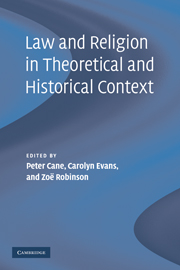Book contents
- Frontmatter
- Contents
- List of Contributors
- 1 Introduction
- 2 The moral economy of religious freedom
- 3 Understanding the religion in freedom of religion
- 4 Why religion belongs in the private sphere, not the public square
- 5 Pluralism in law and religion
- 6 The influence of cultural conflict on the jurisprudence of the religion clauses of the First Amendment
- 7 From Dayton to Dover: the legacy of the Scopes Trial
- 8 A very English affair: establishment and human rights in an organic constitution
- 9 Days of rest in multicultural societies: private, public, separate?
- 10 Australian legal procedures and the protection of secret Aboriginal spiritual beliefs: a fundamental conflict
- 11 Secular and religious conscientious exemptions: between tolerance and equality
- 12 Law's sacred and secular subjects
- 13 Freedom of religion and the European Convention on Human Rights: approaches, trends and tensions
- Index
- References
6 - The influence of cultural conflict on the jurisprudence of the religion clauses of the First Amendment
Published online by Cambridge University Press: 07 July 2009
- Frontmatter
- Contents
- List of Contributors
- 1 Introduction
- 2 The moral economy of religious freedom
- 3 Understanding the religion in freedom of religion
- 4 Why religion belongs in the private sphere, not the public square
- 5 Pluralism in law and religion
- 6 The influence of cultural conflict on the jurisprudence of the religion clauses of the First Amendment
- 7 From Dayton to Dover: the legacy of the Scopes Trial
- 8 A very English affair: establishment and human rights in an organic constitution
- 9 Days of rest in multicultural societies: private, public, separate?
- 10 Australian legal procedures and the protection of secret Aboriginal spiritual beliefs: a fundamental conflict
- 11 Secular and religious conscientious exemptions: between tolerance and equality
- 12 Law's sacred and secular subjects
- 13 Freedom of religion and the European Convention on Human Rights: approaches, trends and tensions
- Index
- References
Summary
For 16 words that remain completely unchanged from their adoption some 215 years ago, the Supreme Court's interpretation of the Religion Clauses of the First Amendment of the United States Constitution have shown remarkable malleability. Arguably, the court's interpretation of these Clauses has changed more often, and more dramatically, than of any other provision of the Constitution. The question I wish to explore is why. To address this question, we must put aside the standard interpretive perspective on constitutional law – the perspective that asks how constitutional provisions should be interpreted, in light of text, original meaning, history, or precedent. Those considerations do not change, at least not rapidly or radically. Instead we must ask how changes in cultural and social conditions have affected the jurisprudence of religion and state.
The First Amendment's Religion Clause consists of two parts. One, the Free Exercise Clause, prevents the government from prohibiting or punishing the profession and practice of any religion. Its counterpart is the Establishment Clause, which prevents the government, at a minimum, from designating any particular religion, articles of faith, or mode of worship as preferred or orthodox, and from compelling any person to participate in or support religious worship. Beyond these clear indications, there has been nearly continual controversy in the United States regarding such issues as: does the Free Exercise Clause protect religiously motivated conduct, such as the practice of polygamy or the refusal of priests to divulge the secrets of the confessional, from neutral and generally applicable laws?
- Type
- Chapter
- Information
- Law and Religion in Theoretical and Historical Context , pp. 100 - 122Publisher: Cambridge University PressPrint publication year: 2008
References
- 1
- Cited by



